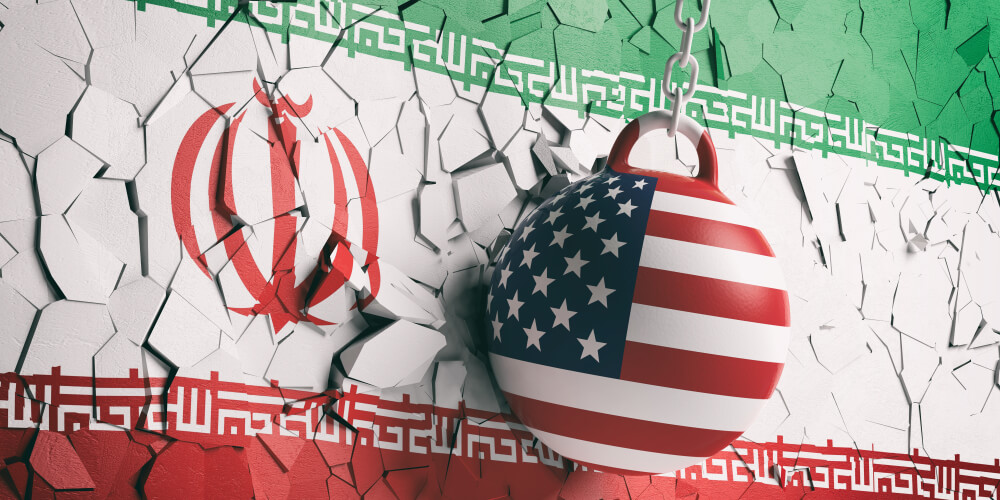As tensions continue to mount between the United States and Iran many may ask, what is the Trump administration trying to get from Iran?
In the latest incident, Iran claims to have shot down a U.S. spy drone near the Strait of Hormuz, the site of an attack on two oil tankers almost exactly a week ago.
Last week’s attack was the latest in a series of assaults on tankers transporting oil through the Gulf. In May, Saudi, Norwegian and Emirati oil tankers were attacked off the coast of the United Arab Emirates, causing damage but no casualties. The attacks have gone unclaimed, so the perpetrator is unknown — at least publicly.
U.S. ally Saudi Arabia, Iran’s regional rival, blamed the Iranian government and called the May attacks “naked aggression.” Saudi King Salman asked the international community to “use all means” to punish Iran.
U.S. national security adviser John Bolton, who has called for bombing Iran to cripple its nuclear program, has maintained that Iran is “almost certainly” responsible for the attacks. In May Bolton announced the deployment to the Persian Gulf of a carrier strike group and a nuclear-capable bomber task force, America’s most formidable military assets.
The purpose: “to send a clear and unmistakable message” to Iran.
But the White House is squabbling over its objectives, which are far from clear. Trump administration officials do not seem to agree whether the U.S. wants behavior change or regime change. Should the U.S. use diplomacy or force? Are frustrated Iranians or frustrated Americans the target of this military deployment?
President Donald Trump told U.K. television host Piers Morgan that military options are on the table but, “I’d much rather talk.”
According to Washington Post columnist David Ignatius, Trump “wants to sound tough (popular) so long as it doesn’t get him into a war (unpopular).” President Trump “doesn’t want to go to war with Iran,” retired General David Petraeus told ABC News.
As a scholar who has studied the onset of a number of wars, I believe these commentators underestimate the influence of shrewd warmongers like Bolton. They also fail to credit how quickly a trivial confrontation between industrialized forces can change a leader’s calculus and drag the great powers and their allies into war.
The showdown in the Persian Gulf is not like the U.S. and the Soviet Union incrementally adjusting the balance of power, as they did during the Cold War.
Mixed signals, bad timing and this kind of uncalibrated brinksmanship is how World War I began and spiraled out of control. It has brought the U.S. closer to the next Middle East war.
Up to the edge
Iran brokered a deal with the U.S., the EU, Russia, China and Germany in 2015 to curtail its nuclear program in exchange for sanctions relief.
The current standoff began in May 2018 when Trump reneged on the deal and later implemented a new “maximum pressure” campaign against Iran, which included economic sanctions punishing countries purchasing Iranian oil.
The U.K., France, China, Russia and Germany pledged to abide by the terms of the deal. Nevertheless, U.S. sanctions against Iranian industry at a time when Iran was complying with the deal are collapsing the Iranian economy.
The White House claims its “maximum pressure” policy is working — that Iran is cutting aid to malevolent allies and proxies in the region, including Syrian President Bashar al-Assad, Hezbollah and Hamas.
U.S. Secretary of State Mike Pompeo maintains, without evidence or a tangible timeline, that grueling economic conditions created by the U.S. will turn frustrated Iranians against their leaders, provoking regime change.
That idea seems to me to be magical thinking. U.S. belligerence, especially when it has been rejected by the broader international community — as it is now by parties to the 2015 nuclear deal – is more likely to turn Iranians against the U.S., polarize U.S. allies and strengthen Iran’s hardliners.
Cosmopolitan Iranian youth, for example, who are the best hope for peace with the U.S., are the most likely group to turn against their government — but not if the Trump administration strangles their economy and threatens to invade their country.
Limited choices
In the meantime, Iran’s economic troubles are narrowing its options.
According to the International Atomic Energy Agency, Iran has accelerated uranium enrichment and intends to quadruple production, in violation of the nuclear deal. Attacks on U.S. forces or allies, including Israel, are becoming increasingly appealing to Iranian leaders to give Iran some leverage against the U.S.
The prospect of economic collapse under draconian sanctions by the U.S. also provokes Iran’s leaders to instigate a confrontation sooner rather than later, while its military and proxies are strong. Iranian President Hassan Rouhani has given Germany, the U.K., France, China and Russia until July 7 to honor their promise to buttress Iranian energy and banking sectors before taking additional steps to withdraw from the nuclear deal.
Iran’s economic and military weakness also encourages its leadership to cooperate more closely with America’s foreign adversaries, including Russia, despite Iran’s aversion to ceding precious influence in the region.
If the Iran-Russia relationship tightens, it will result in even greater tension with the U.S. Increased Iranian-Russian cooperation is also an invitation to U.S. leaders to strike before U.S. troops find themselves facing an emboldened Iranian military reinforced with Russian equipment and know-how.
With each day of U.S. sanctions, Iran’s leaders become increasingly desperate, with diminished leverage should the two countries face off on the battlefield or at the negotiating table.
© The Associated Press. All rights reserved.
